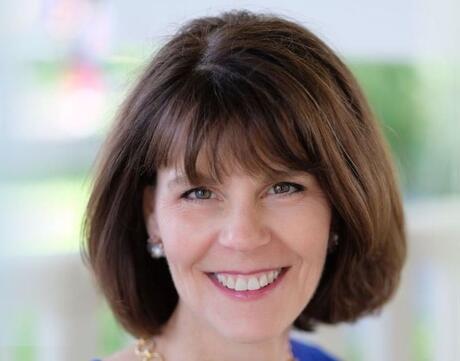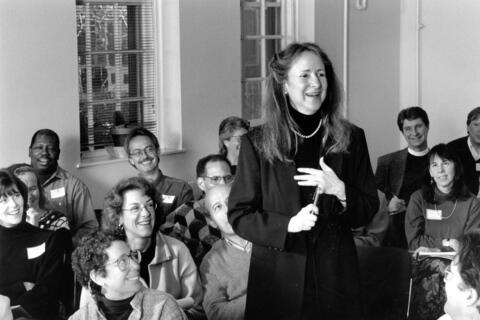
“Facing History stays with you.”
Facing History & Ourselves is a bustling learning community. There are hundreds of thousands of people who intersect with our work, use our materials, attend our workshops, and help us develop and deliver best-in-class educational content. From our board members to our staff, from our donors to our educators, and so many more, Facing History’s success relies on the collaboration of our community.
For over 30 years Elaine Guarnieri-Nunn has been connected with Facing History, helping it grow into the internationally recognized institution it is today.
Elaine recently spoke with me about her dynamic personal history with our organization—from being a teacher who had never heard of Facing History to her current leadership role as Executive Director of Strategic Program Implementation. She was kind enough to sit down and share her unique, wide-lens perspective on where Facing History’s been and where it’s going.
Jessica: Can you tell me about your history with Facing History?
Elaine Guarnieri-Nunn: So I am the classic teacher's story. I was a social studies teacher at Roosevelt High School in East LA in the early nineties, and I was asked to go to a five-day Facing History summer institute along with my teaching partner. I remember thinking, “I can't be out of the classroom for five days!” But I went, and by the end of the first day I realized how powerful the experience was. I left the institute and realized that Facing History’s approach was the way I've always wanted to educate—it really resonated with me. It reminded me of why I became a history teacher.
I wanted my students to experience what I’d learned at the institute. My teaching partner and I came back, we totally revamped our curriculum, and we ended up teaching six weeks of Holocaust and Human Behavior.
After that I taught Facing History material for a number of years. Coincidentally the chairperson of my department at that time was Dan Alba. He eventually left the school and founded the Facing History Los Angeles office.
Three years later, when Dan had the opportunity to hire the first program associate in LA, I jumped at it. I was Facing History’s first Los Angeles PA.
Four years later I left due to a move to the East coast. Fast forward 14 years later, I had relocated again to San Francisco, and I received a call asking, “Would you want to come back to Facing History in a different role?” It was perfect timing.
Jessica: How has working with Facing History shaped who you are?
Elaine: I actually cannot imagine—it's hard to separate myself from Facing History. There's definitely parts of the person I am now that have been shaped by my years working with this organization. It has helped me as a parent. It has helped me as a citizen. It's just given me a lens through which to look at the world.
For example, I cannot tell you how many times in conversations I cite the “universe of obligation” when considering our responsibility to each other. I think it's a really interesting metaphor to use when talking about someone’s place in their community and about the responsibility we all have to each other.
And recently, after the passing of our founder Margot Stern Strom, I’ve been thinking a lot about some of the folks who have stayed at Facing History for many many years. There's something very special about having a shared experience of walking through this curriculum together and listening to Holocaust survivors. Being in the same room as witnesses to history—there’s something so unique and bonding about it.
There’s a head and heart experience here that continues to shape your choices, and that's really difficult to accomplish. It has this sort of stickiness that I think other organizations or other curricular approaches lack. Facing History stays with you.
Jessica: Do you have a particularly powerful memory from your years with Facing History?
Elaine: That first year when I was in the classroom teaching Facing History was the same year as the LA Riots (1992), and my students were from all over LA. Some came from South Central, some from East LA, and my students were watching their city being torn asunder, particularly in their own communities where they were seeing things like looting firsthand.
Amid this big news event, and as we studied the Holocaust and Human Behavior curriculum, we started having conversations about neighbor turning against neighbor. We were exploring conversations about being a bystander and being an upstander. Simultaneously the kids were seeing people who were upstanders and people who were bystanders in real time — both on television and near their homes.
Facing History absolutely allowed my students to have the vocabulary they needed to not just watch history unfold, but to actually talk about what they were witnessing and discuss their own role.
For me, that was such a transformative experience to see the impact Facing History had on a group of adolescents in real time.

Elaine Guarnieri-Nunn (far left) listens as Facing History’s founder Margot Stern Strom speaks to a community group.
Jessica: What excites you about what Facing History is doing today?
Elaine: What thrills me at the moment are our plans to reach more teachers. Another aspect of our work that excites me is our accessibility. When I began as a PA, in the late nineties, teachers had to physically come to us for professional learning. They had to travel to our workshops, and only once they were there did they get introduced to our content and pedagogy.
Well, now we are a digital organization. We have teachers from everywhere accessing our content who live outside of our regional office areas. I still value in-person professional learning, and I still want educators to come out for those opportunities, but I get so excited thinking about all the new teams out there, all the teachers in isolated communities who just have to click a button to reach us.
For instance, I'm really excited about how we’re expanding into more of the southern US. I think our strategic goals to reach more educators and schools across the country has the ability to transform teacher practice.
Jessica: Your role is fairly new to Facing History. Why was it created and what do you do?
Elaine: My role was designed to help us develop even stronger alignment in our program across the US. We have seven offices across the country and it’s critical to really support the program staff in each of these regions as they begin to shift their strategy to engaging with schools, district leaders, and teachers in schools in which we are in partnership. The hope is that my role offers our program teams that support and makes it easier to meet goals such as identifying schools and districts for engagement and opportunities to serve more educators.
As part of my job I bring program directors from across the US together (virtually) on a bi-weekly basis to meet. And last year what came out of one group meeting was a collaboration between our offices in Cleveland and New England. They offered a hybrid workshop series on ELA that would never have been possible years before. The workshop series started online, and then they had in-person sessions both in Boston and in Cleveland, and then it finished back online. I think that if we always keep the user—the educator—in mind, we have so much ability to innovate our curriculum and our offerings beyond the already stellar material we provide.
The world is so different from when I started my teaching career. I've just returned from a trip to Italy. Thirty years ago I would have had to go into the AAA office to get maps or consult with a travel agent. But now I have the ability at my fingertips to do all of that myself. In the same way, user expectations with Facing History have changed over time. And teaching has changed over time. We have to keep up. We have to think about adaptation: what are the different modalities in which teachers can access our content and our training? So I find my work really compelling as our organization has started thinking bigger and more adaptively.
I have a deep love for Facing History and I have a legacy here. One reason among many why I pursued this role was because I felt like I could really be of great service as we work toward a more collaborative and cooperative organizational strategy because I understand our history. I have connections with many staff from the founding generation, but I am also deeply motivated to innovate and take Facing History in new and exciting directions. The work we’re doing now is the way we're going to reach more teachers and really have the greatest impact.

